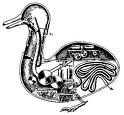 Meanings are determined by their use (by their links to situated usage of them). Similarly identity is determined by the roles you apply that identity for. Meanings don't pre-exist their application. That's why our need of search engine is satisfied by Google. Identity don't pre-exist their social activity. That's why our social connectivity is satisfied by Facebook. Interestingly the always omnipresent efficiency of Google crashed against a wall with Buzz: it tried to treat meanings as identity. Now Facebook with the will-be omnipresent “like” is trying to treat identities like meanings.
Meanings are determined by their use (by their links to situated usage of them). Similarly identity is determined by the roles you apply that identity for. Meanings don't pre-exist their application. That's why our need of search engine is satisfied by Google. Identity don't pre-exist their social activity. That's why our social connectivity is satisfied by Facebook. Interestingly the always omnipresent efficiency of Google crashed against a wall with Buzz: it tried to treat meanings as identity. Now Facebook with the will-be omnipresent “like” is trying to treat identities like meanings.I'm very curious because I know that Google is right about meanings: or you're Platonist. Indeed meanings mean what they mean because they have an intrinsic value (“meaning”) or because we are more likely to associate some concepts in some clouds. Moral lesson from Google semantic: no matter how you want to grasp something, the only thing you can grasp is a collective association of usages. Meanings are empty: it's just the search around that gives them a
 semantic gravity.
semantic gravity.Now the like-function of Facebook is presenting a very hot dilemma: our identities are the deployment of social activity. This social structuring is a complex architecture determined by your cultural cognitive activity: your mind. Now this architecture will become public and then weighted and finally ranked.
 It's not the first time we face this technological situation: in ancient Greece, reading was public. The technological way to decode signs to concept was something done only in public. Then Aristotle developed a new technique: reading with his mind. And this was his nickname: the mind.
It's not the first time we face this technological situation: in ancient Greece, reading was public. The technological way to decode signs to concept was something done only in public. Then Aristotle developed a new technique: reading with his mind. And this was his nickname: the mind.








